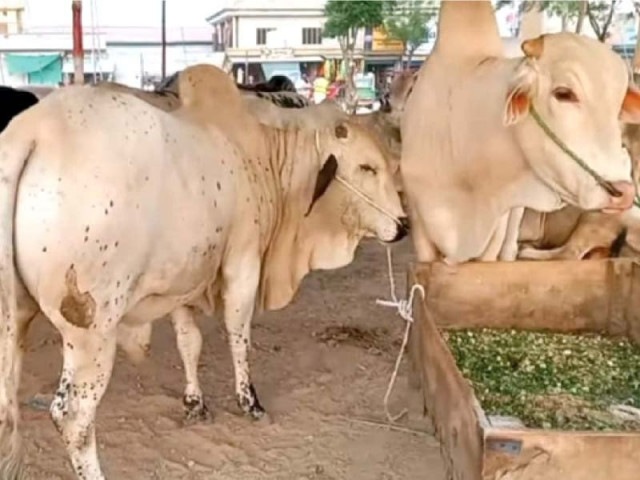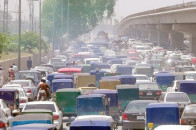Sluggish market irks cattle traders
Citizens say sacrificial animal prices have increased by 40%-60%

Though cattle markets have been flooded with shoppers ahead of Eidul Azha but sluggish trading activity is being reported owing to high prices of sacrificial animals.
Speaking to The Express Tribune, various citizens complained about a 40%-60% increase in sacrificial animal prices in comparison to last year’s rate. A citizen, Sheikh Bilal, said though Eidul Azha is a religious festival that teaches sacrifice people have made it the season of commercial activity. The price of sacrificial animals have been skyrocketed and made it difficult for citizens to fulfil this religious obligation.
Another citizen, Anees Mughal, highlighted that he wanted to sacrifice a goat on Eid but rates of small animals had gone beyond his reach.
After visiting two cattle markets in the city, he said, he had decided to take a share in the big animal because Covid-19 and consecutive lockdowns have already eaten away most of his savings.
Mughal said the exorbitant increase in sacrificial animal prices on the pretext of high transportation and cattle raising costs has added a burden on the salaried class and lower-income group.
In addition, the government is issuing a warning of the fourth wave of covid-19 and lockdowns after the Eid holidays.
Similar, remarks were made by several other citizens visiting sacrificial animal markets in different areas of the city. A citizen, Kashif Chughtai, said the government should regulate prices of sacrificial animals and rein in the profit spree which had made qurbani difficult for most citizens. “Current price trend shows that a large number of citizens, especially the salaried class would not be able to buy an animal this year,” he said and highlighted that an average size goat or sheep is being traded for Rs35,000 to Rs40,000.
Read More: Eid nears, sacrificial animal rates skyrocket
Almost an equal size animal was being sold for Rs23,000 to Rs28,000 last year.
A Survey of different sacrificial animal markets shows that cattle farmers and traders are demanding Rs40,000 to Rs60,000 for goat, Rs35,000 to Rs55,000 for sheep and Rs80,000 to Rs140,000 for a calf or a cow of average weight. Well-built animals have altogether different prices in the city.
On the other hand, cattle farmers and vendors blame petroleum products rate, transportation costs, fodder prices, labour rates and above all inflation for the high price of sacrificial animals.
A cattle farmer from Rajanpur, Muhammad Buksh, complained that transportation charges have been doubled in comparison to last year owing to an increase in petroleum products rates.
“Farmers have to pay high transportation charges and bribe to police during transit and citizens expect they sell their produce at throwaway rates in cities. We raise animals for the whole year to earn livelihood during eid season,” he maintained.
Another cattle trader, Allah Ditta, complained about sluggish trading activity.
He said Eid was just around the corner and most people are still visiting markets to check rates. Almost half of the citizens in cattle markets are checking prices and not willing to pay a reasonable price.
Besides animals, butchers have also increased their rates to slaughter animals during three days of Eid.
Banners have been displayed in front of their shops for advance booking for slaughtering animals. The rate for slaughtering small animals on the first day of Eid has been asked Rs4,000 to Rs6,000 per animal and Rs3,000 to Rs5,000 for the second and third day.
Similarly, for big animals, the rate for slaughtering service is ranging from Rs8,000 to Rs15,000 per animal.
Published in The Express Tribune, July 21st, 2021.



















COMMENTS
Comments are moderated and generally will be posted if they are on-topic and not abusive.
For more information, please see our Comments FAQ